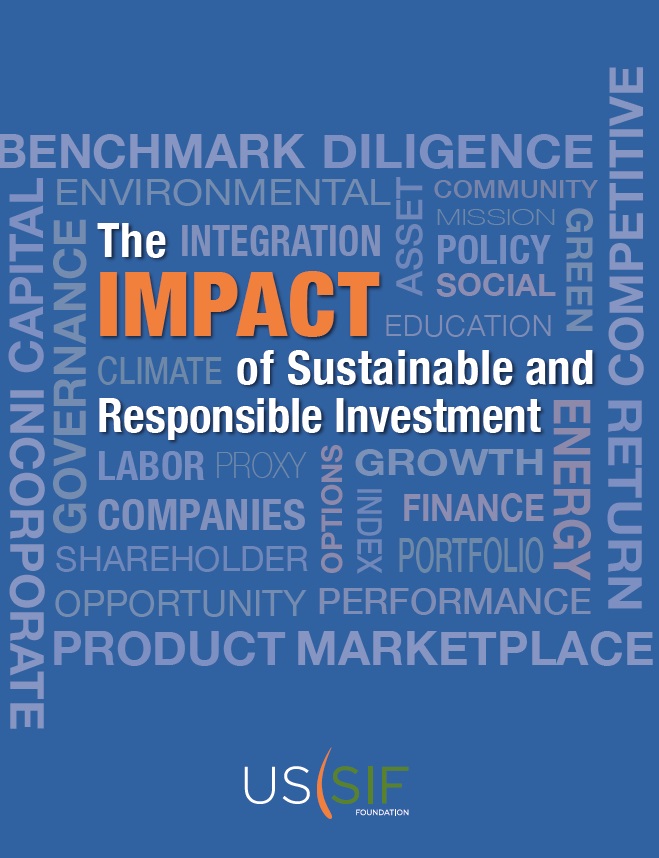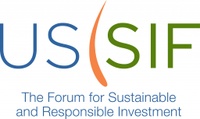The Impact of Sustainable and Responsible Investment
EXECUTIVE SUMMARY
Sustainable, responsible and impact investors are a force for positive change. They have helped to improve the environmental, social and governance (ESG) practices of publicly and privately traded companies in the United States and around the world, indirectly benefiting countless individuals and communities. They have pursued investment strategies that foster economic development and expand financial services in lower-income communities. To advance their principles and priorities on a larger scale, these investors have advocated for public policy to advance responsible investing and supported US and global organizations that promote sustainable investment. Many of these accomplishments have been achieved through close collaboration with other stakeholders including business, government and civil society.
Sustainable, responsible and impact investment professionals have changed the investment industry by challenging and shifting traditional notions of investment practices. They have advanced the inclusion of ESG considerations in investment decisions to generate both positive societal impact and long-term competitive financial returns. In so doing, they have brought to market new investment options and services across a wide array of asset classes that appeal to both individual and institutional investors, perform competitively and help address serious social and environmental challenges.
CHANGING THE INVESTMENT INDUSTRY AND ADDING OPTIONS FOR INVESTORS
Sustainable, responsible and impact investment (SRI) is a widely practiced investment discipline with more than $6.57 trillion in assets under management in the United States, according to the US SIF Foundation’s 2014 Report on US Sustainable, Responsible and Impact Investing Trends. Its practitioners have contributed to far-reaching changes in the investment and financial services industries, and it continues to gain adherents in investment firms that have not historically identified themselves as SRI practitioners.
By incorporating ESG criteria into investment analysis and portfolio construction, investors seek to identify more responsible companies for potential investment and to improve the sustainability performance of those in which they are already invested. Testaments to the growing impact of SRI on the investment marketplace can be found in the creation of SRI indices and in the widespread availability of ESG information to conventional investment analysts as criteria for holdings selection. Many publicly traded companies, in turn, aim to be selected for SRI funds and promote their inclusion in SRI indexes to their stakeholders. Efforts to build ESG investment criteria into investment portfolio construction, proxy policies and engagement strategies have resulted in positive changes in the way business is conducted.
The growth of the sustainable investing field is reflected in the growth of investment products across all asset classes, including fixed income, private equity and real estate, and of investment products that focus on particular sustainability or impact themes—such as clean energy or women’s advancement. The array of investment products has facilitated the adoption of mission investing by foundations and has helped meet the growing interest of family offices and high net worth individuals in investing for impact.
Individual investors have benefited by gaining access to corporate, non-profit and government retirement plans with SRI options and the ability to work with specialized SRI financial advisors. Investors also benefit from being able to invest in communities directly through banks, credit unions and other community development financial institutions as well as in retail products and on retail platforms for domestic and international opportunities aimed at helping low income and distressed populations.
IMPROVING COMPANIES THROUGH ACTIVE OWNERSHIP AND ENGAGEMENT
Sustainable investors have made a difference by using active share ownership and engagement to encourage more responsible and forward-thinking corporate practices. Investors—often in concert with civil society organizations and multi-stakeholder groups—have helped persuade numerous publicly held companies to:
• improve climate risk disclosure, set greenhouse gas emission reduction goals, adopt goals to reduce energy use or to use renewable energy,
• implement sustainable forestry practices,
• address poor labor and human rights conditions in their global supply chains,
• pledge not to discriminate against employees on the basis of their sexual orientation,
• disclose health, safety and environmental risks associated with hydraulic fracturing,
• promote gender diversity on their boards of directors,
• issue detailed reports on sustainability,
• report on political and lobbying expenditures and establish policies to oversee or limit such spending,
and
• provide investors who meet specified ownership criteria with access to their proxy materials in order to nominate alternative directors to the board.
Engagement strategies have also been used successfully to help shape sustainable policies and practices at privately held companies on sustainability issues, such as the labor conditions in their global supply chains and their environmental and community relations practices.
HELPING COMMUNITIES AND INDIVIDUALS
SRI investors have assisted individuals and communities, both through direct investments in community development initiatives and by helping to bring about changes in corporate behavior that ultimately benefit communities or reduce harm, such as increasing access to clean water and curbing deforestation. In the United States and internationally, investments in community investing institutions have helped ensure that capital reaches poor or underserved communities. These investments in low- and moderate-income communities have improved access to affordable housing, supported small businesses, helped create jobs, and provided education, healthcare and childcare facilities. Sustainable investors have also provided innovative social private equity and microenterprise lending in international markets. For example, these investors have made micro-financing available to many women entrepreneurs in Africa, Asia and Latin America.
INFLUENCING PUBLIC POLICY AND DEVELOPING ORGANIZATIONS TO PROMOTE SUSTAINABLE INVESTMENT
Sustainable and responsible investors have exerted influence to make public policy that helps create conditions—including level playing fields—that allows sustainable enterprises to compete and thrive.
In the United States, responsible investors played an important role in advancing key elements of the Dodd-Frank Wall Street Financial Reform and Consumer Act of 2010 (“Dodd-Frank Act”). Among the priorities for which they successfully advocated were provisions to: require greater accountability by publicly traded companies concerning executive compensation and pay disparity, facilitate shareholders’ ability to nominate directors to the boards of portfolio companies, curtail the trade of conflict minerals from war-torn areas of central Africa, and require publicly traded companies in the extractive industries to disclose their payments to national governments. By advocating for the creation of the Consumer Financial Protection Bureau, another important outcome of the Dodd-Frank Act, responsible investors contributed to protecting American consumers from unfair, deceptive and abusive financial practices.
US SIF and sustainable investors, in a coalition with a diverse set of partners, played an important role in the US Department of Labor’s decision to rescind its 2008 bulletin on Economically Targeted Investments, which had discouraged fiduciaries for private sector retirement plans from considering environmental and social factors in their investments. In its place, Labor Secretary Thomas Perez issued guidance that makes clear that fiduciaries may incorporate “ESG-related tools, metrics and analyses to evaluate an investment’s risk or return or choose among otherwise equivalent investments.” Sustainable investors have mobilized in support of stronger environmental regulations, helping to ensure that companies report information on their greenhouse gas emissions and risks related to climate change. Sustainable investors actively endorsed the US Environmental Protection Agency’s 2011 rule on curbing mercury and other toxic emissions from coal- and oil-fired electric generating units. They have also endorsed the EPA’s Clean Power Plan (CPP), a crucial step in meeting the United States’ international commitment to reduce carbon emissions by as much as 28 percent below 2005 levels by 2025.
To help address global human rights violations, SRI investors joined with civil society organizations to call for an end to human rights abuses in Burma and Sudan, and some developed targeted divestment policies for those countries or held shareholder campaigns to raise concerns to multinational companies operating there. These strategies increased public awareness of the human rights concerns in both countries and helped to build public support for global economic and diplomatic pressure on their governments. US sanctions against Burma have since been lifted, as the military junta has moved to share power with democratically elected representatives.
Sustainable investors have founded and supported US and global organizations that promote sustainable investment. Many of these organizations have produced research that underscores that environmental, social and corporate governance issues can pose material financial risks and opportunities to companies and therefore should be considered in fiduciaries’ due diligence efforts.
To download the full report, please click here.

